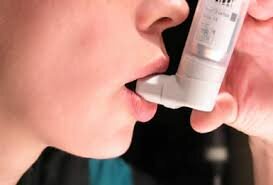Asthma Triggers
It is estimated that 25 million people in the United States are currently living with asthma. That equals out to one in every 12 people or about 8% of the population. That’s a lot of people. But for a disease that is so common, symptoms and triggers can be confusing. Let’s shed some light on asthma.
Asthma Symptoms
 The symptoms of asthma can be vast and varied but typically include shortness of breath, wheezing while breathing, tightness in the chest and excessive or painful coughing. If you experience any of these symptoms, be sure to visit your allergist to determine causes and triggers. Left untreated, allergies can also develop into asthma. Be safe and consult your allergist early on.Symptoms of an asthma attack are caused by constriction (tightening of the muscles) and inflammation (swelling and irritation) of the airways. During an attack the muscles around the airways spasm, the mucosal membrane lining the airways gets inflamed, and excessive amounts of mucus flow in the airways all contributing to the narrowing of the airway. This increases constriction and makes breathing very difficult.
The symptoms of asthma can be vast and varied but typically include shortness of breath, wheezing while breathing, tightness in the chest and excessive or painful coughing. If you experience any of these symptoms, be sure to visit your allergist to determine causes and triggers. Left untreated, allergies can also develop into asthma. Be safe and consult your allergist early on.Symptoms of an asthma attack are caused by constriction (tightening of the muscles) and inflammation (swelling and irritation) of the airways. During an attack the muscles around the airways spasm, the mucosal membrane lining the airways gets inflamed, and excessive amounts of mucus flow in the airways all contributing to the narrowing of the airway. This increases constriction and makes breathing very difficult.
Types of Asthma and Causes
Depending on each person, asthma attacks can be caused by either internal and/or external triggers. Asthma is commonly categorized by symptom triggers. These categories include:Allergic Asthma triggered by allergic reactions to allergens such as pet dander, dust or dust mites, mold or pollen.Seasonal Asthma triggered by seasonal allergic reactions to allergens such as trees, grasses, or weeds.Non-Allergic Asthma triggered by irritants in the air that you breathe such as tobacco smoke, wood smoke, room deodorizers, fresh paint, and perfume.Exercise-Induced Asthma triggered by exercise or physical activity.Nocturnal Asthma can occur in a patient with any of the aforementioned types of asthma, though the asthma symptoms will increase or worsen at night.Asthma is the most common chronic illness among children. If a child's asthma is left untreated, it can result in loss of sleep, exercise limitations, absenteeism, emergency room visits and, in a few cases, death. Asthma in both adults and children can be effectively managed with medications and "trigger" avoidance.Receiving medical help for asthma is essential. If you're concerned that you or a loved one is showing signs of asthma, please consult your allergist. Live in the NYC area, call my office to arrange a consultation, (212) 247-7447
